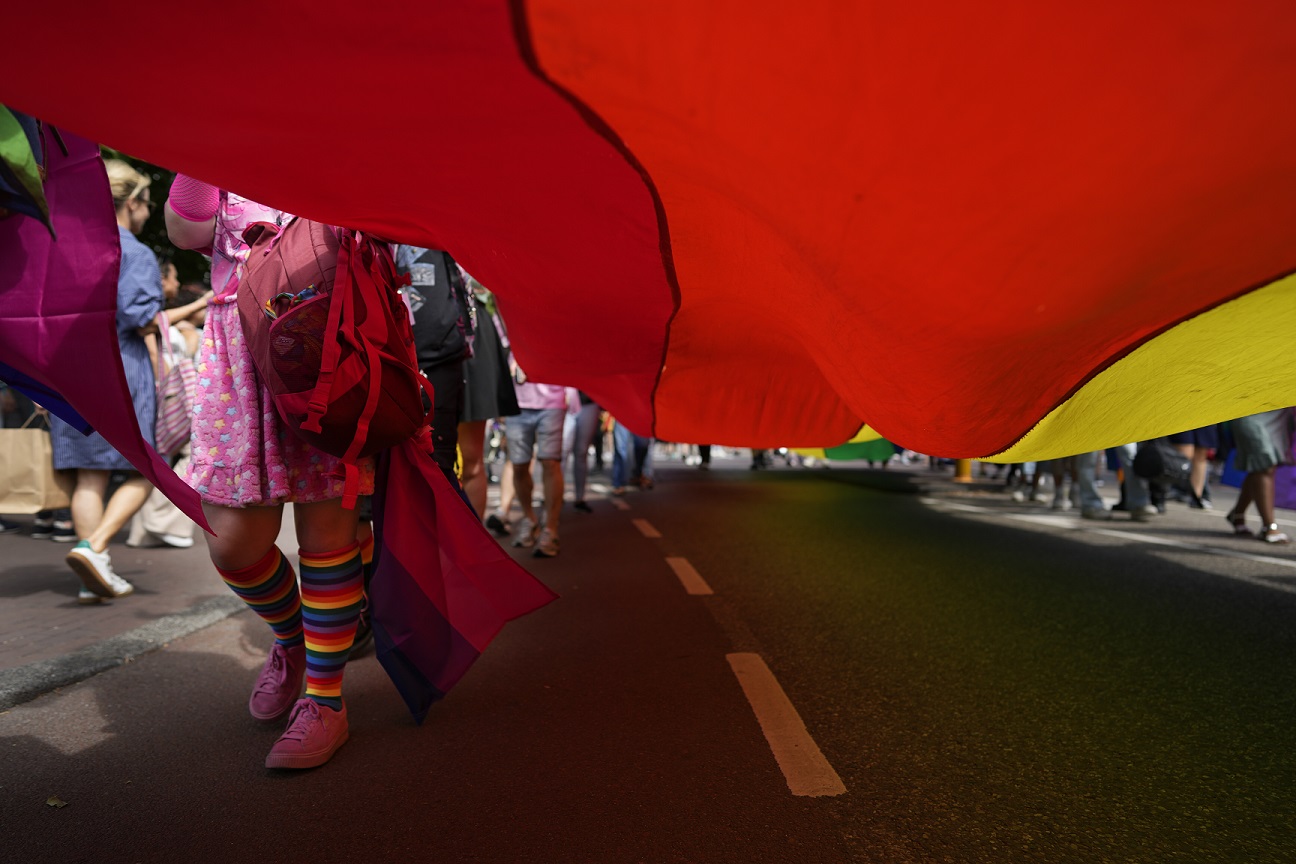In a recent video of a U.S. Congressional hearing on the effects of the Supreme Court ruling that the constitution does not enshrine the right to abortion, Republican Senator Josh Hawley asked Berkeley law professor Khiara Bridges if she meant “women” when she used the term “persons with the capacity to become pregnant.” Bridges responded that trans men and non-binary people also could conceive. In response to Hawley’s question about whether the current hearing also concerns women’s rights, Bridges accused him of transphobia:
“I want to point out that your way of questioning is transphobic and exposes trans people to violence.”
There were enthusiastic comments on Twitter under the video saying Bridges had “slammed” Hawley. At the same time, most of society will be on Hawley’s side. On the other side of the Atlantic, it is evident that after many years of the unstoppable advance of trans ideology through institutions, a counter-strike has started.
Feelings trump facts
There is a rare diagnosis known as gender dysphoria. That is the medical name for when a person feels they are a different gender than the one they were born with. People with this diagnosis try to live and appear as persons of the opposite sex, and sometimes they undergo surgery. For a long time, no one disputed that a trans woman is a biological man and vice versa. But then, contemporary transgender activism appeared, claiming that the determinants are not biological facts, but the inner feeling of the person concerned. Hence the custom of announcing one’s pronouns spread; just because someone looks like a man does not mean they cannot be a woman, according to transgenderism. On the contrary, the inner feeling of the person in question completely overwhelms the biological reality. If someone says they are a woman, they are a woman, no matter what they have between their legs. If anyone declares himself to be of the opposite sex and decides to undergo medical procedures, no one has the right to prevent him from doing so.
Added to this was the claim that biological sex itself does not exist. According to trans activists, gender is a spectrum, and no one can define where male ends and female begins. They make no bones about the obstinate protests of biologists that this is not true. Trans ideology is not entirely internally consistent. On the one hand, gender is a spectrum, and everyone can change it at will. On the other hand, a person can be re-operated so that at first glance, they show typical features of the opposite sex.
Perhaps it would be possible to dismiss transgenderism as a crazy cult, with which a few leftists are mainly harming themselves, but this ideology has penetrated the mainstream and had negative consequences. One is the admission of biological men, who identify as women, into exclusively female spaces. In the U.S., the “battle for the toilets” raged when trans women were allowed to use women’s toilets. The problem also appeared in sports, as men have a clear biological advantage over women. The placement of trans women in women’s prisons is also controversial. Recently, in the American state of New Jersey, two inmates became pregnant after intercourse with a trans woman.
Trans factory
However, the issue of transgenderism and children is the most problematic. Any medical procedures at a young age can have unforeseeable consequences, so it is necessary to proceed with the utmost caution. However, trans activists claim that children can choose their gender, and they must be accommodated as much as possible. The British LGBT non-profit Stonewall tweeted:
“Research suggests that children recognize their trans identity as early as two years old. Yet in many kindergartens and schools, a binary understanding of predetermined gender is taught. LGBTQ inclusive and affirming education is key to the well-being of all young people!”
But the tables are starting to turn. Stonewall deleted its tweet after protests, saying it only wanted to highlight harmful gender stereotypes. On Thursday, Britain’s NHS announced that it would be closing the infamous Tavistock Clinic, or rather, the department that is known as the Gender Identity Development Service, GIDS for short. It is a specialist facility founded in 1989 to help children and young people who have problems with their gender identity. GIDS had a privileged position in England, being the only workplace in the country authorized to perform gender reassignment operations on children. However, in recent years, it has been rocked by scandals, as the clinic acted more like a factory producing transgender children.
This is what I wrote about GIDS in December 2020:
“However, it is undoubtedly a victory for children’s health. The Tavistock clinic has faced scandals for several years. Many suspect it of being taken over by transgender activists who do not care about the welfare of children but are interested in creating as many transgender people as possible. Last year, an internal report warned that the clinic was not fit for purpose, and several parents complained that the clinic was deliberately steering children towards a transgender identity. Former staff member Dr. David Bell, who wrote the report, accused the institution of not sufficiently considering the psychological and social factors that could affect children. Within three years, 35 psychologists resigned, some because they feared the clinic was over-diagnosing gender dysphoria.
Last year, the clinic treated 2,560 young people with gender dysphoria, a 6 percent increase over the previous year and a 30-fold increase over 10 years. Of these, 2,376 were under 18 years of age, 10 were under four years old, and nearly 230 were under 10 years of age.”
Last year, the Tavistock clinic examined 5,000 children.
Expert pediatrician Hilary Cass dealt a death blow to GIDS with a report that condemned its practices. She described the mindless use of puberty blockers as particularly serious.
“We do not fully understand the role of sex hormones in adolescence and how they influence the development of sexuality and gender identity in early adolescence, so we cannot be sure of the impact of stopping the influx of these hormones on psycho-sexual and sexual maturation. We cannot know whether puberty blockers, instead of buying time to make a decision, disrupt that decision-making process,” Cass wrote. She recommended research into the effects of puberty blockers. That they were deployed without fully understanding the possible consequences is a scandal.
Regional centers were created in children’s hospitals to take care of children who doubted their gender identity in cooperation with psychiatry.
Left wing feminists lead on the issue
Interestingly, left-wing feminists have taken the lead in the reaction against transgenderism. On the one hand, they resented the reduction of the term “woman” to insignificance. In the case of children, however, they also drew attention to their childhood years. As children, they rebelled against female stereotypes, especially after they reached puberty and began to separate from boys. Julie Bindel, a lesbian radical feminist, wrote on the Unherd website:
“Growing up in the 1970s on a council estate, like most women, I struggled with my feelings about girlhood. Conformity was everything there, and I hated dresses, tights, and wearing unruly hair in a bun. Sometimes I would lock myself in the bathroom and try on my brother’s Brutus jeans and a t-shirt, imagining what it would be like to be able to dress however I wanted. I wasn’t interested in boys and was in love with my best friend. If I had been born 40 years later and had liberal, middle-class parents, they would have offered me a trip to the gender clinic, and I would have run straight there. I was desperate to be a boy — not because I was trapped in the wrong body, but because I was trapped in a patriarchal society that punishes girls for not conforming to sexual stereotypes, otherwise known as ‘gender.'”
Bindel and others like her fear that it is mainly girls like her who go to gender clinics. Instead of being told they will grow out of it or reassured that it is okay to be a girl who does not like skirts and dolls, they are labeled as trans boys. The numbers support this assumption. In 2017, 70 percent of GIDS patients were girls, compared to 75 percent being boys 10 years earlier.
Thanks to an alliance between radical feminists and social conservatives, transgenderism appears to be declining in Britain. It is not just about closing the Tavistock clinic. British courts have repeatedly ruled in favor of people fired from their jobs for questioning transgenderism, and after a series of BBC reports on Stonewall’s practices, many companies and organizations cut ties with the charity. Perhaps not all battles of the culture wars must go one way.






